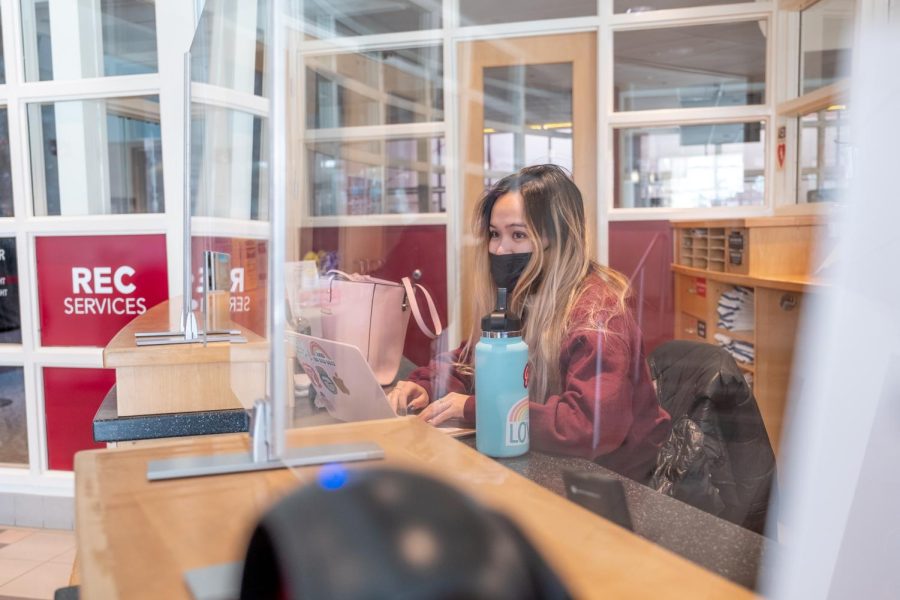Floor for student minimum wage increased to $8.25
The increase in student minimum wage this spring is the first step in reevaluating salaries for future fiscal years. (Photo by Caroline Burns ’22 for The Lafayette)
January 28, 2022
Nearly two and a half years after Student Government unanimously passed a resolution to increase the campus minimum wage for student workers from $7.25 to $10 an hour, the minimum wage was increased to $8.25 an hour for any work being done on campus. While the increase was lower than the $2.75 increase students had hoped for, many found it a first step in the right direction.
“I think sometimes in life people think like it’s all or nothing. Like you either do the entire lift now or you don’t do it at all. I think what I’m trying to get the campus to realize is we need to make value-based decisions,” President Hurd said. “Maybe we don’t have the resources to get all the way to one hundred percent of the request. But just because we can’t get to one hundred doesn’t mean we stay at zero.”
Effective Jan. 1, 2022, the announcement from the Human Resources Department also included an outline for suggested student pay rates based on the skill level required for the work, but all salaries above minimum wage are at the discretion of the hiring department.
“My lens ever since I got here is just how do we recover from this pandemic, and I think this is a sign of recovery, frankly,” Hurd said. “We’re squarely in conversations with both the faculty and the staff about the [twenty] twenty-three budget in terms of faculty and staff compensation. This was a place where we can move on to student compensation.”
Many students were not anticipating an increase to minimum wage until the end of this fiscal year at the end of spring 2022.
“I didn’t expect it to raise to be raised this month of January, I was waiting until the end of the spring semester. But I think it made a lot of people happy to see that,” Student Government President Flor Caceres ’22 said. “There’s at least a glimmer of hope in knowing that the institution was ready to move forward with increasing the minimum wage and allowing for that increase to keep on happening in the following years with the help of Student Government.”
Hurd pulled from funds set aside for presidential initiatives to ensure students could see an increase before July 1, according to Annette Diorio, the Vice President for Campus Life.
“The budget for this year had already been set. So, this was me saying we’re going to revise the budget,” Hurd said. “It wasn’t a hard decision. But I did have to think about resource allocation and find funds that were not allocated for that purpose and move them.”
In the upcoming fiscal year, additional funds will be put towards salaries for student workers to balance the additional cost to the college, and student wages will continue to be reevaluated in the coming years for additional increases.
“We know that we’re certainly behind. The target for the state remains fourteen or fifteen dollars. Do I think we’re going to get to thirteen dollars the next couple years? No, but do I think we’ll try to keep bumping it up a little bit closer to ten? Sure. I hope you would be able to do that every few years,” Diorio said.
Caceres explained that the resolution, passed in May 2019, was spearheaded by Fraynette Familia ‘20, whose vision was to push for wages of a minimum of $12 or $13 after the administration approved a $10 minimum.
“I definitely would have wanted it to be higher. But it’s fine, I’ll be happy with this progress for now. I can at least know that we’re moving upwards. But I would have definitely wanted it to be higher because eight dollars is not really a livable wage either,” Caceres said. “But we’ll see what happens in the next few years. I at least know that the work was finally put in from the administration so that a legacy can continue with future presidents who can help carry on with this work or future representatives as well.”
While the floor raise for student minimum wage is generally viewed as a positive change, departments providing employment for students such as Recreation Services are now operating with entry-level employees making the same hourly wages to students who have worked towards raises, sometimes over multiple years.
“Our employees earn more faster when they demonstrate greater engagement with the department, show a commitment to teamwork, and increase their knowledge base. The recent increase in the minimum, not surprisingly, has compressed our pay scaled quite a bit,” Jodie Frey, associate dean of students and director of Recreation Services wrote in an email. “That means, for at least this semester at least, we have employees with several semesters of experience and higher performance ratings making the same hourly wage as those in their first semester of employment.”
The department’s overall payment system will not be fully adjusted until Fall 2022.
Frey explained that the department uses the Program for Recognizing Outstanding Performance Standards (PROPS) system to reward hardworking student workers. The current version is now out of date due to the hike as students in supervisor roles with outstanding performance now make as much as those with new profiles.
“We are very grateful that the President generously supported the initial increase to the minimum for all students. I also think it is reasonable for all of us to exercise some degree of patience as next steps are weighed. In preparation, Recreation Services has drafted a few versions of an adjusted PROPS scale, for entry-level and leadership positions, that we will be ready to implement if additional funds become available.”
The administration is planning to look at modifying the ceiling for student wages in the upcoming fiscal years to adjust for this imbalance and introducing a new community-wide budget committee with students, faculty and staff.
Conversations about adjusting the ceiling are likely to begin in February or March of 2022 when the administration begins the process of reviewing next year’s budget.
“I can’t wait to get some student input and also start to move towards this community-wide budget committee so we can make values-based decisions including looking at compensation,” Hurd said. “So, we are just trying to be much more inclusive. It’s on the table for our next fiscal year. That increase we made was squarely a way of doing something now in our current fiscal year.”


























































































































